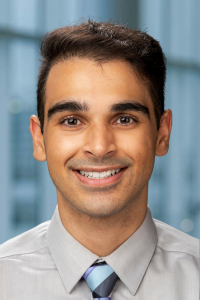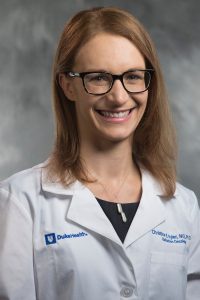Before he sat down to take the ABR Diagnostic Radiology Qualifying (Core) Exam in June, Ali Tejani, MD, did all the prep work.
The UT Southwestern Medical Center resident put in years of study, supplemented by case-based lectures at his program, materials provided by the ABR, and other sources. He completed the ABR’s Exam Readiness Check and answered the provided sample questions to gain familiarity with the remote platform.
At the start of the three-day exam, though, his webcam started acting up.

“Everything was working well, but then in the exam software, everything got really dark,” said Dr. Tejani, a diagnostic radiologist and one of 1,446 candidates to take the exam last month. “The concern was whether (exam monitors) could see me. Was I still meeting the requirements for being observed during the exam? I didn’t want to start the exam until that was clear.”
It was time to call the ABR’s Exam Day Help Desk. With the handy help desk flyer that includes contact information at his side, Dr. Tejani reached the ABR and, within minutes, was assured that everything was all right.
“They were able to talk to the people who were watching my video,” he said. “They were able to clear my video and, I think more importantly, they were able to message me using the exam software. I wasn’t just flying blind. Someone’s there watching and monitoring for these issues.”
Dr. Tejani contacted the Exam Day Help Desk two more times: when his video quality was impacted by a nearby storm in Dallas and when the identity verification process slowed as he was trying to re-enter the exam platform one afternoon.
He was relieved to know that calls to the desk didn’t affect his exam time. He also appreciated having a single ABR representative helping him instead of getting bounced around a phone tree.
“It was good to have an agent on the line who was working with me ensuring that (time on the phone) wouldn’t affect my time on the exam and staying with me until the problem was fixed,” he said.
Dr. Tejani took the exam at his program’s facilities, ensuring that he had information technology backup in case something went wrong. He followed the ABR’s suggestion to go through the Exam Readiness Check at the location and on the computer that he planned to use on exam day.
“Being able to experience the testing software makes sure that you’re not figuring that out on the first day of your exam,” he said. “When time is of the essence, you have this opportunity to hit the ground running. That was significant to me.”
Remote exams place responsibility on the examinee to have their technology in order and to locate an optimal location that will be free of distractions. UT Southwestern Medical Center officials knew the importance of arranging assistance. They set up dedicated exam space and provided IT staff well in advance of the event.
“I was fortunate to have support from my program knowing that there was a team of people with me along the way,” he said.
Dr. Tejani will complete his residency next June and head to a neuroradiology fellowship at the University of California, San Francisco. Even with the bulk of his training behind him, he remains available for fellow residents who need counsel as they prepare for the Qualifying (Core) Exam.
It’s one more layer of reassurance to help residents as they prepare to take the comprehensive exam.
“Every resident has a responsibility to be available as a resource,” he said. “Our field depends on future generations as leaders, and our small role is to make sure that they have the resources and knowledge that they need to one day be in the position that we’re in.”
Writing questions for ABR exams is serious work. But volunteers can still have fun in the process.
Christine Eyler, MD, PhD, a radiation oncologist and member of a committee that develops questions for the Biology and Physics Qualifying Exam, said she and her colleagues find ways to keep the mood light even as they spend hours writing and reviewing questions for candidates.
“I laugh a lot,” she said. “It’s a funnier group than I ever thought there would be writing radiation biology questions. But people are legitimately funny, and it’s been a really warm group.”
Learning to write fair and relevant questions is challenging. New committee members go through a breaking-in process the first several times they try.

“In the first review of questions, it was almost like stage fright in terms of having to explain and defend your questions,” she said. “But I feel more like it’s a collaborative workshop than a spotlight on deficiencies. That’s been really pleasant.”
Dr. Eyler’s question-writing acumen is quickly getting better, but there remain areas where she wants to improve.
“I’m on the wordier side, so writing questions that are clear, to the point, and easy to answer is a skill that I’m still working on,” she said.
Dr. Eyler is the Butler Harris Assistant Professor in Radiation Oncology at the Duke University School of Medicine and a member of the Duke Cancer Institute. She fills several roles, spending four days a week in the lab or teaching and the other day seeing patients at VA Durham Healthcare. Her lab and instruction work allows her to interact with residents who will be taking ABR Initial Certification exams, and her clinical duties provide the opportunity to directly serve patients and see real-life cases.
She believes both experiences give her a well-rounded approach to her ABR volunteer tasks.
“(Working with residents) makes it a little bit easier because I can put myself in the head of someone who doesn’t marinate in some of these more nuanced topics all day every day and say, ‘Is there any sort of patient relevant issue that can be tested here?’” she said. “Since I also see patients, that’s a hat I can easily put on.”
She’s proud to be a scientist and clinician at Duke. She has three technicians, an undergraduate, and a resident researcher helping in her lab, where the work involves genetic and epigenetic consequences of tumor evolution under treatment pressure.
“The initial pretreatment tumor, the tumor after a few weeks of treatment, and the tumor at the end when resistance develops looks quite different,” Dr. Eyler said. “I’m interested in describing that and seeing if there’s any sort of alternative treatment strategies that might capitalize on any Achilles heels that are revealed over that evolution process.”
Duke Health contracts with the Durham VA to provide services, giving Dr. Eyler the chance to see patients with varied conditions.
“If I’m a specialist in anything, it’s GI, but I see little bit of everything,” she said. “I think that my base of clinically relevant material has expanded considerably because I see a little bit of prostate, a little bit of breast, some brain tumors. I see a little bit of everything in addition to my GI focus. I’m constantly reviewing things because that’s a lot of stuff to stay fresh on.”
Dr. Eyler has a simple but effective way to remember cases when it’s time to develop exam questions.
“I have a little set of sticky notes,” she said. “I have sticky notes everywhere.”
Being prepared helps her feel a better kinship with the group, even over video calls. The committee hasn’t met in person since she joined.
Dr. Eyler was recruited to the team by a scientific mentor and former committee member. Despite the challenging work, she and her colleagues have a good time as they work to improve their exam.
“The people on the committee make it fun,” she said. “It says a lot that some of the members have been there for years.”
The ABR seeks input from stakeholders in various ways, including through initial and continuing certification advisory committees. Volunteers on those committees help provide direction and act as liaisons between the organization and participants.
In this video, Catheryn M. Yashar, MD, an ABR trustee and chair of the Radiation Oncology Continuing Certification Advisory Committee, explains why the work performed by members is vital to the Board’s mission of serving patients.


